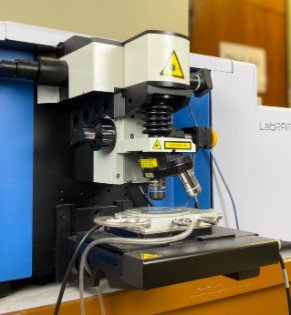Spectroscopy Laboratory
Spectroscopy Laboratory
Description
Description
Description
| Instrument | KFUPM First | KFUPM Additional | Non-Profit First | Non-Profit Additional | Commercial First | Commercial Additional |
|---|---|---|---|---|---|---|
| SERS | 150 | 130 | 225 | 195 | 600 | 520 |
| FT-IR | 130 | 100 | 195 | 150 | 520 | 400 |
Description
Description

Location:
Chemistry Department
Building #4, Room #154
Scientist In-Charge:
Name: Mr. Hassan Amasha
Phone: 3859
E-mail: hassan.amasha@kfupm.edu.sa
Surface Enhanced Raman Scattering (SERS)
The LabRAM HR Evolution Raman microscopes are ideally suited for both micro andmacro measurements, and offer advanced confocal imaging capabilities in 2D and 3D.
The true confocal Raman microscope enables the most detailed images and analyses tobe obtained with speed and confidence. With guaranteed high performance and intuitivesimplicity
Main Features:
Two laser types (633nm, 532nm)
Heating stage
Three Olympus focus lenses.

Location:
Chemistry Department
Building #4, Room #154
Scientist In-Charge:
Name: Mr. Mansour Alzaki
Phone: 3859
E-mail: malzaki@kfupm.edu.sa
FT-IR Spectrophotometer
Nicolet 6700 FT-IR spectrometers from Thermo Electron Corporation are the highest performance FT-IR (Fourier Transform InfraredSpectroscopy) systems. FTIR Analysis or FTIR Spectroscopy, is an analytical technique used to identify organic, polymeric, and, in some cases,inorganic materials. The FTIR analysis method uses infrared light to scan test samples and observe chemical properties. The FTIR instrumentsends infrared radiation of about 10,000 to 100 cm-1 through a sample, with some radiation absorbed and some passed through. The absorbedradiation is converted into rotational and/or vibrational energy by the sample molecules. The resulting signal at the detector presents as aspectrum, typically from 4000 cm-1 to 400cm-1, representing a molecular fingerprint of the sample. Each molecule or chemical structure willproduce a unique spectral fingerprint, making FTIR analysis a great tool for chemical identification.
Main Features:
- OMNIC software
- 525 - 4500 cm-1 range with MCT-A detector (LN2-cooled)
- 375 - 4500 cm-1 range with DTGS TEC detector (RT)
- KBr beam splitter
- Transmission setup for gas, liquid and solid samples (user needs to provide gas and/or liquid cell)